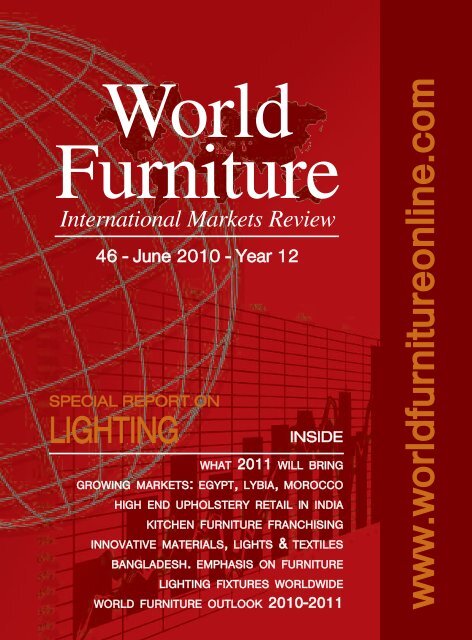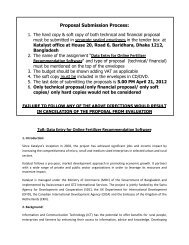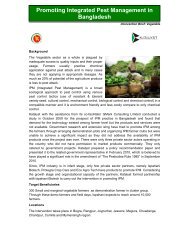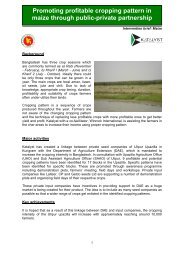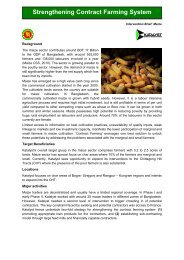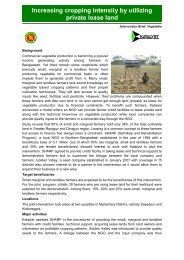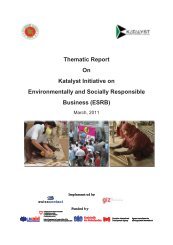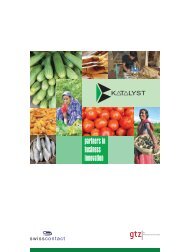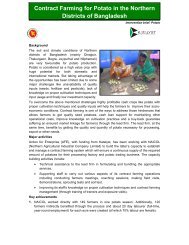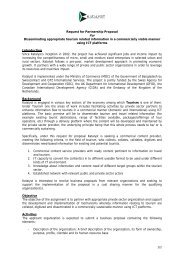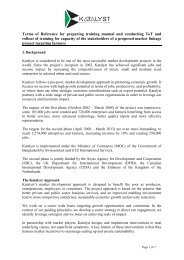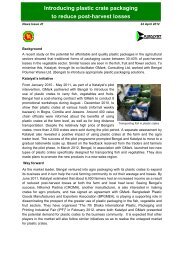Katalysing the growth of Bangladesh furniture sector - Katalyst
Katalysing the growth of Bangladesh furniture sector - Katalyst
Katalysing the growth of Bangladesh furniture sector - Katalyst
You also want an ePaper? Increase the reach of your titles
YUMPU automatically turns print PDFs into web optimized ePapers that Google loves.
World<br />
Furniture<br />
International Markets Review<br />
46 - June 2010 - Year 12<br />
SPECIAL REPORT ON<br />
LIGHTING<br />
INSIDE<br />
WHAT 2011 WILL BRING<br />
GROWING MARKETS: EGYPT, LYBIA, MOROCCO<br />
HIGH END UPHOLSTERY RETAIL IN INDIA<br />
KITCHEN FURNITURE FRANCHISING<br />
INNOVATIVE MATERIALS, LIGHTS & TEXTILES<br />
BANGLADESH. EMPHASIS ON FURNITURE<br />
LIGHTING FIXTURES WORLDWIDE<br />
WORLD FURNITURE OUTLOOK 2010-2011<br />
www.world<strong>furniture</strong>online.com
STRATEGIES<br />
KATALYSING THE GROWTH<br />
OF BANGLADESH<br />
FURNITURE SECTOR<br />
by Nusrat Nahid<br />
Manager, Industry & Rural Sectors<br />
Group <strong>Katalyst</strong>, <strong>Bangladesh</strong><br />
B<br />
angladesh is a developing country<br />
in <strong>the</strong> South Asia. It is surrounded<br />
by India and Myanmar<br />
on <strong>the</strong> north, west and <strong>the</strong> east<br />
respectively and is washed by <strong>the</strong> Bay <strong>of</strong><br />
Bengal at <strong>the</strong> south. The country is wellknown<br />
to <strong>the</strong> world for its ready-made<br />
garments and knitwear industry, which is<br />
<strong>the</strong> top-most export product followed by<br />
<strong>the</strong> frozen foods.<br />
<strong>Bangladesh</strong>, a riverine delta, is mainly a<br />
plain land <strong>of</strong>fering very fertile crop and<br />
fish cultivation zones to <strong>the</strong> native population.<br />
Fur<strong>the</strong>r, over <strong>the</strong> years, different<br />
donor projects have been involved in <strong>the</strong><br />
agricultural and fisheries <strong>sector</strong>s <strong>of</strong><br />
<strong>Bangladesh</strong> to address food security and<br />
rural livelihoods improvement issues.<br />
The projects were and still are involved to<br />
enhance <strong>the</strong> technical know-how <strong>of</strong> <strong>the</strong><br />
farmers, create provision for access to<br />
quality inputs and increase productivity<br />
and get better price. In comparison to<br />
this, <strong>the</strong>re were only a few supporting<br />
projects for <strong>the</strong> development <strong>of</strong> <strong>the</strong> industrial<br />
or service <strong>sector</strong> <strong>of</strong> <strong>Bangladesh</strong>.<br />
Never<strong>the</strong>less, with <strong>the</strong> passage <strong>of</strong> time,<br />
<strong>the</strong> national level policy makers and <strong>the</strong><br />
government <strong>of</strong> <strong>Bangladesh</strong> have put<br />
emphasis on <strong>the</strong> development <strong>of</strong> <strong>the</strong> latter.<br />
At this backdrop, when <strong>Katalyst</strong> was<br />
launched (implemented by Swisscontact<br />
and GTZ International Services) in<br />
October 2002 (formerly named as<br />
Developing Business Services Market-<br />
DBSM), it contained both urban and rural<br />
<strong>sector</strong>s in its portfolio. The project was<br />
initially funded by a consortium <strong>of</strong><br />
European donors, namely <strong>the</strong><br />
Department for International Development-DfID,<br />
UK, Swiss Development<br />
Cooperation-SDC and Swedish International<br />
Development Agency-SIDA.<br />
It was roughly a CHF 24 M project operating<br />
in <strong>the</strong> north and south <strong>of</strong><br />
<strong>Bangladesh</strong> for agriculture and aquaculture<br />
<strong>sector</strong>s and only in and around<br />
Dhaka for <strong>the</strong> manufacturing <strong>sector</strong>s.<br />
Historically, <strong>Bangladesh</strong> has grown different<br />
industrial and service clusters<br />
across <strong>the</strong> country <strong>of</strong>fering <strong>the</strong> potential<br />
to change and improve quite rapidly provided<br />
<strong>the</strong>re is a common vision and commitment<br />
amongst <strong>the</strong> cluster members.<br />
Hence for urban <strong>sector</strong>s, <strong>the</strong> initial focus<br />
was to work in different clusters following<br />
Courtesy: Jalal Furniture Company Limited<br />
<strong>the</strong> cluster development and value chain<br />
approach. The role <strong>of</strong> <strong>the</strong> movers and<br />
shakers, <strong>the</strong> low hanging fruits providing<br />
quick benefits and <strong>the</strong> long-term overarching<br />
goal-all blended and mixed to<br />
obtain <strong>the</strong> objective <strong>of</strong> <strong>the</strong> project which<br />
is by and large poverty alleviation through<br />
enterprise competitiveness.<br />
<strong>Katalyst</strong> launched its program in <strong>the</strong> <strong>furniture</strong><br />
<strong>sector</strong> in 2004. The initial activities<br />
were in <strong>the</strong> Mirpur <strong>furniture</strong> cluster and<br />
manufacturers were supported to compete<br />
effectively against <strong>the</strong> imported products<br />
in terms <strong>of</strong> product quality (new<br />
finishing: lacquer, <strong>furniture</strong> making with<br />
alternative to wood: MDF), with better<br />
marketing practices (sales promotion in<br />
<strong>the</strong> cluster, after-sales service, customer<br />
responsiveness) and through more cooperation<br />
amongst <strong>the</strong> cluster members.<br />
<strong>Katalyst</strong> also received requests from <strong>the</strong><br />
large local brands to explore <strong>the</strong> international<br />
<strong>furniture</strong> market.<br />
A study on <strong>the</strong> export readiness assessment<br />
was conducted on <strong>the</strong> eight<br />
potential exporting firms by <strong>the</strong> Aktrin-<br />
14 WF - June 2010
STRATEGIES<br />
Csil is a group <strong>of</strong> international<br />
consultants who have<br />
experience in developing<br />
export strategies. After a<br />
week-long visit to <strong>furniture</strong><br />
factories and showrooms,<br />
<strong>the</strong> resource persons presented<br />
a strategy to related<br />
stakeholders on 18 February<br />
2010.<br />
Photo credit: Legacy Furniture Ltd.<br />
The team for formulating national<br />
export plan comprised <strong>of</strong><br />
Reine Karlsson, <strong>the</strong> Country<br />
Sales Director <strong>of</strong> Ikea, Finland with experience<br />
in international trade and supply<br />
chain management.<br />
REGION No OF CLUSTERS % OF DISTRIBUTION<br />
Dhaka 57 47.11%<br />
Chitlagong 26 21.49%<br />
Sylhet 6 4.96%<br />
Comilla 5 4.13%<br />
Tangail 3 2.48%<br />
Gajipur 6 4.96%<br />
Narayanganj 6 4.96%<br />
Jessore 5 4.13%<br />
Faridpur 1 .83%<br />
Bogra 6 4.96%<br />
Total 121 100%<br />
Furniture clusters in different geographical<br />
locations <strong>of</strong> <strong>Bangladesh</strong><br />
Dossenbach Associates. The committed<br />
firms were <strong>the</strong>n taken to <strong>Bangladesh</strong><br />
Expo in <strong>the</strong> UK in 2005, International<br />
Furniture Fair in Tokyo and production<br />
facilities in China in 2006. This was to<br />
provide <strong>the</strong>m with a glimpse <strong>of</strong> where <strong>the</strong><br />
world stands and where did <strong>the</strong>y stand<br />
and where <strong>the</strong>y needed to go to make<br />
export happen from <strong>Bangladesh</strong>.<br />
As a result <strong>of</strong> <strong>the</strong>se endeavours, three<br />
firms started to export in a limited scale<br />
to India, a market close to <strong>Bangladesh</strong><br />
and depending largely on imported <strong>furniture</strong>.<br />
One <strong>of</strong> <strong>the</strong> firms started to negotiate<br />
with buyers in Japan for wooden floor<br />
tiles.<br />
<strong>Katalyst</strong> grew bigger in phase II starting<br />
April 2008. UKAid (formerly branded as<br />
DfID), SDC were joined by <strong>the</strong> Canadian<br />
International Development Agency –<br />
CIDA and <strong>the</strong> Embassy <strong>of</strong> <strong>the</strong> Kingdom<br />
<strong>of</strong> <strong>the</strong> Ne<strong>the</strong>rlands-EKN and <strong>the</strong> size <strong>of</strong><br />
<strong>the</strong> project became CHF 54 M. With<br />
phase II, <strong>the</strong> project became ambitious<br />
to achieve scale and reach more enterprises<br />
with sustainable and effective outcome<br />
<strong>of</strong> <strong>the</strong> endeavours. In stead <strong>of</strong><br />
Mirpur and a handful <strong>of</strong> large manufacturers,<br />
<strong>Bangladesh</strong> <strong>furniture</strong> <strong>sector</strong> has<br />
Csil team visiting <strong>furniture</strong> firms in <strong>Bangladesh</strong><br />
been taken in <strong>the</strong> portfolio. The <strong>sector</strong><br />
organized in 121 clusters comprises <strong>of</strong><br />
71,000 enterprises employing around<br />
1.7 M workers. The GDP contribution<br />
was 0.29% in 2008-09 with value addition<br />
worth USD 26 M with a 19% <strong>growth</strong><br />
rate <strong>of</strong> <strong>the</strong> <strong>sector</strong>. (Furniture Sector<br />
Strategy, <strong>Katalyst</strong> 2009)<br />
<strong>Katalyst</strong> aims to establish <strong>Bangladesh</strong><br />
<strong>furniture</strong> industry as an exporting one<br />
whilst developing <strong>the</strong> competence <strong>of</strong> <strong>the</strong><br />
selected local clusters to be integrated in<br />
<strong>the</strong> system and be benefited from <strong>the</strong><br />
emerging <strong>growth</strong> opportunities. In doing<br />
so, <strong>Katalyst</strong> will work on improving <strong>the</strong><br />
quality <strong>of</strong> <strong>the</strong> products through improved<br />
productivity and skills and creating market<br />
linkages both home and abroad.<br />
With a scanty USD 3 M <strong>furniture</strong> export<br />
in 2008-09, <strong>the</strong> <strong>sector</strong> was lacking a<br />
comprehensive plan endorsed by relevant<br />
public and private <strong>sector</strong> stakeholders.<br />
<strong>Katalyst</strong> has been working with <strong>the</strong><br />
Export Promotion Bureau (EPB), Ministry<br />
<strong>of</strong> Commerce, <strong>Bangladesh</strong> and Furniture<br />
Exporters’ Association (BFEA) to formulate<br />
a national plan for <strong>furniture</strong> export.<br />
As part <strong>of</strong> this collaboration <strong>Katalyst</strong><br />
brought in Csil, Center for Industrial<br />
Studies, Milan.<br />
Where as, Greger Nordin, ano<strong>the</strong>r<br />
member <strong>of</strong> <strong>the</strong> team, is an<br />
expert in setting up export ready<br />
factory/production in Europe<br />
and Asia.<br />
In addtion to <strong>the</strong>m, <strong>the</strong>re were<br />
Mauro Spinelli, with expertise in<br />
market research and intelligence<br />
and Valentina Downey, a product<br />
designer for several design houses<br />
including Thai <strong>furniture</strong> for<br />
Italian market. Based on <strong>the</strong><br />
assessment, <strong>the</strong> team has suggested<br />
a couple <strong>of</strong> markets where<br />
<strong>Bangladesh</strong> can enter with <strong>furniture</strong>,<br />
crafts and textile accessories. As per <strong>the</strong><br />
SWOT analysis, <strong>the</strong> team envisaged that<br />
<strong>Bangladesh</strong> could possibly export USD<br />
50 M by 2015 provided <strong>the</strong>re is favourable<br />
tariff structure, firms improve working<br />
conditions and be more responsible to<br />
environment.<br />
The firms also need to improve production<br />
and market linkage. The team fur<strong>the</strong>r<br />
advised to work on a sustailable plantation<br />
programme to obtain Forestry<br />
Stewardship Council’s certificate and<br />
increase export volume to USD 1 bn by<br />
2020.<br />
<strong>Katalyst</strong>, EPB and BFEA will follow <strong>the</strong><br />
plan with guidance from national and<br />
international resource persons in<br />
addressing <strong>the</strong> issues <strong>of</strong> conducive business<br />
enviroment, export marketing,<br />
improved production facilities, better<br />
designs and communication and o<strong>the</strong>r<br />
compliance issues. <strong>Katalyst</strong> has also<br />
launched development program for different<br />
<strong>furniture</strong> clusters in <strong>Bangladesh</strong> to<br />
build a strong base <strong>of</strong> <strong>furniture</strong> suppliers<br />
in <strong>the</strong> near future.<br />
June 2010 - WF<br />
15


